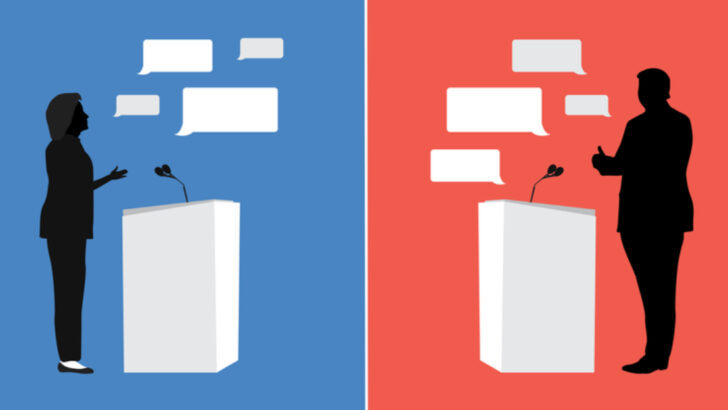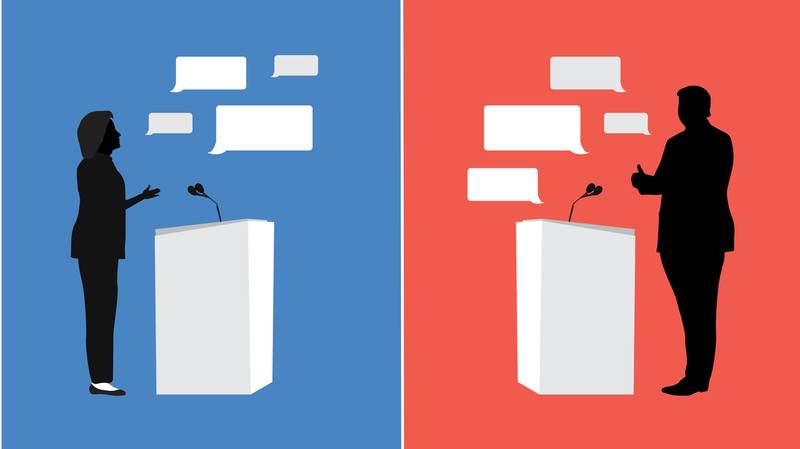You know that moment—a conversation shifts, someone drops a phrase, and suddenly, the whole room feels colder. It’s wild how a few words can either make someone feel right at home or like they never belonged in the first place.
I’ve watched people break, laugh, or grow silent over a single sentence. Language is personal. What comforts one person can set another on edge, and sometimes it’s the phrases we use without thinking that cut deepest.
The words you choose—at work, at dinner, or in a late-night text—carry all the weight of your history, your pain, your hope.
I want to talk about the lines we throw around, the ones that can either sting or stick, depending on who’s listening and why. No judgment. Just honesty. Let’s see what stories these 15 phrases really tell.
1. “Don’t be so dramatic”
It’s wild how quick people are to toss out this one. Maybe you said it, maybe you heard it. Either way, it’s the sound of someone putting up a wall instead of listening.
This phrase isn’t just words—it’s a shut door. When you’re finally brave enough to speak up, to let someone in on what hurts or what matters, and this is what you get back? It feels like being told your feelings are a punchline.
Funny thing is, for some folks hearing this line is liberation, not insult. That’s the divide: One person’s drama is another’s overdue honesty. It’s rarely about the actual event; it’s about being seen—or not.
2. “It doesn’t affect you, so why do you care so much?”
You ever been told, “Why bother? It’s not your fight?” For some, that’s a slap in the face—like empathy should have boundaries. The truth is, we’re wired to care about things, even when they don’t knock on our own door.
There’s pride in fighting for what matters, even if it’s not your skin in the game. This phrase tries to shut down that instinct, making passion sound like meddling or virtue-signaling.
To others, though, this line sounds like plain common sense. “Worry about your own problems,” they say, head down, heart guarded. Maybe it’s fear, maybe it’s exhaustion. Either way, this phrase draws a sharp line between apathy and activism—and makes you question which side you’re really on.
3. “We’ve been through this before”
It’s the conversational equivalent of a slammed door. You finally gather the courage to bring up something that’s been gnawing at you, and suddenly you’re labeled repetitive—nagging, even.
Maybe you’re just looking for a different outcome, for real change. For some, this phrase is a barrier—like your pain expired after the first mention. But for others, it’s a lifeline. Rehashing old fights isn’t progress in their world; it’s just digging up graves.
Both sides want peace, but the phrase means opposite things. One person craves closure, the other craves quiet. It’s not about the argument; it’s about needing to be heard versus needing to move on. Nobody really wins when the conversation ends before it starts.
4. “You’re twisting my words”
This is sharp, almost theatrical—like you’re suddenly on trial. I’ve seen eyes narrow and voices rise after this one. Usually, it’s less about what was said and more about feeling misunderstood or out of control.
If you’ve ever argued with a narcissist, you know this phrase is their bread and butter. It’s a defense mechanism, a way to flip the script and avoid accountability. But honestly, anyone can throw it around when they feel cornered.
The thing is, sometimes words do get tangled, meanings lost in the heat. For some, calling it out is a demand for clarity; for others, it’s a power move. This phrase isn’t just about the words—it’s about who gets to define the truth in the room.
5. “I don’t need your approval”
There’s a certain defiance in saying, “I don’t need your approval.” Sometimes, it’s the only way to reclaim your own story when everyone else is talking over it. I’ve said it—usually after biting my tongue too long.
For folks who crave independence, this phrase is a rallying cry. It’s freedom from the exhausting need to be liked. But to someone who built their identity on others’ validation, these words cut deep. It can feel like rejection, plain and simple.
It doesn’t always land as an insult. To some, it’s a badge of adulthood; to others, a knife in the back. Funny how the same words can sound like courage or contempt, just depending on which side of approval you grew up on.
6. “I wasn’t thinking about you”
Ouch. Few things sting like realizing you didn’t cross someone’s mind when you thought you mattered most. It can sound flippant, but sometimes it’s just the truth said out loud.
There are days you want to be the center of someone’s universe, but you’re just a passing thought. This phrase brings up all the insecurities—did I ask for too much? Was I ever important? Some people use it as a reset, a way to push back against guilt trips or manipulation.
Others hear it and feel erased. It’s not always cold; sometimes it’s honest. That’s where it gets tricky—one person’s honesty is another’s heartbreak. The phrase reminds us that expectations can be traps, especially when unspoken.
7. “It’s just a joke”
“It’s just a joke,” they say, as if laughter should heal all wounds. I’ve watched people freeze mid-laugh, suddenly realizing they’re the butt of it.
Humor can be armor or a weapon, and this phrase blurs the line. For some, it’s a way to bond—roasting each other means you’re close. But for others, it’s an excuse to dodge responsibility for words that cut too deep.
You can’t always know where someone’s bruises are. Maybe you meant to be funny, not cruel. But if someone flinches, maybe it wasn’t just a joke. The phrase can be an invitation to lighten up—or a warning that you crossed a line.
8. “That’s not fair”
Life isn’t fair. We all know that, but try telling it to someone who just lost something they cared about. This usualy comes out in a voice breaking between anger and hope.
To some, it’s childish. Judges, teachers, parents—they hear this phrase and roll their eyes. But for others, it’s the only way to point out real injustice, to refuse to accept what feels wrong.
It can sound like whining. Or it can sound brave, the first step towards demanding better. The phrase sits in the space between wanting things to change and accepting that on occasion, they just won’t. That frustration? It’s more universal than people admit.
9. “Off the reservation”
History hides in plain sight. I’ve heard it said in boardrooms like it’s just another way to say someone went rogue. But the roots are tangled in pain most people don’t even realize.
The phrase comes from a history of forced relocation and suffering for Indigenous people. For some, it’s just workplace jargon. For others, it’s a reminder of erasure and disrespect, woven quietly into everyday talk.
Language evolves, but not always for the better. If you’ve heard this and felt the sting, you’re not alone. It’s a phrase that divides not just by meaning, but by the weight of the history it carries into the room.
10. “Gypped”
This word still floats through conversations like it’s harmless, but the roots are ugly. “Gypped” comes from a stereotype about the Romani people—a group that’s survived centuries of prejudice.
Most people who use it have no idea. It’s shorthand for being cheated, but for those who know where it comes from, it’s a slap in the face. Once you hear the real story, it’s hard to unhear it.
Some insist it’s just a word—don’t take things so seriously. But if your history was used as an insult, wouldn’t you feel differently? It’s a reminder that language can be both invisible and invasive, shaping how we see (and hurt) each other.
11. “Bugger”
Over a pint in a crowded pub, someone drops “bugger” like it’s just a joke or an everyday slip. The word is casual, tossed around with laughter in some circles, but loaded with history that most don’t see.
From old French roots, it carried accusations and prejudice—once used to brand outsiders and heretics. For many Brits, it’s become a harmless expletive, but for others, the echoes of old wounds linger.
It’s strange how a single word can mean mischief for some and marginalization for others. The more you look, the more you see that old language is never really just old—it comes with baggage, whether we realize it or not.
12. “The itis”
After a feast, someone leans back, pats their stomach, and says, “Got the itis.” It sounds harmless, a funny way to talk about food comas. But the phrase has roots in racist caricature, something you don’t hear in the laughter.
Most don’t know the origin—it was once used to mock and stereotype Black communities. Now, it floats around dinner tables, sometimes provoking discomfort, sometimes just a shrug.
It’s a reminder that cultural memory lingers in language. Some brush it off as outdated slang; others feel the weight of history every time it’s said. Words can feed us or starve us, and it’s good to know which is which.
13. “Snowflake”
“Snowflake”—the insult du jour for anyone who dares to care too much or feel too deeply. It’s tossed like confetti on college campuses, online forums, and Thanksgiving tables.
For some, it’s just banter—teasing about sensitivity. But for others, it’s a way to silence or belittle, making empathy sound like weakness. I’ve seen people shrink after being called this, suddenly afraid to share anything real.
But here’s the twist: Those called “snowflakes” often wear it as a badge. They’d rather melt than harden. The word divides, sure, but it also exposes who’s willing to feel—and who’s terrified of it.
14. “Extremist”
You can spot the shift in the room when someone drops the word “extremist.” Suddenly, the debate isn’t about ideas—it’s about who gets to stay at the table. It’s a label that can end conversations before they start.
For some, it’s a warning sign: steer clear, this person’s dangerous or unreasonable. For others, though, it’s just another way to shut down opinions that make us uncomfortable. I’ve watched people lose friends, jobs, or family ties after getting this label.
In certain moments, it’s earned, in others, it’s just a lazy shortcut. Either way, it creates a wall between “us” e “them,” and leaves little room for nuance, curiosity, or understanding. When did disagreement become a disqualifier?
15. “That’s just the way the world works”
You hear it from people tired of fighting—“That’s just the way the world works.” For some, it’s resignation, a way to let go of things they can’t change. For others, it’s a hand pushing you down when you’re just trying to stand up.
I remember this phrase landing like a cold slap, usually from someone older who’d given up on fairness. It can sound wise or crushing, depending on what you needed in that moment. To some, it’s a comfort—accepting the world’s limits. To others, it’s a cop-out.
The phrase draws a line between those who accept and those who rebel. Either way, it challenges you: Will you settle, or will you fight for something different?
















